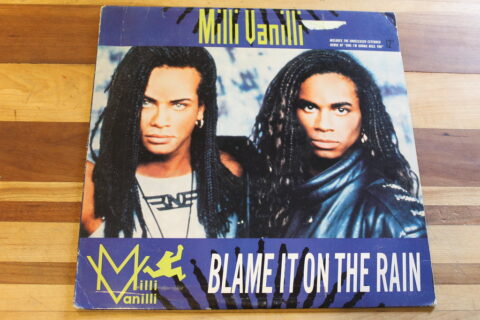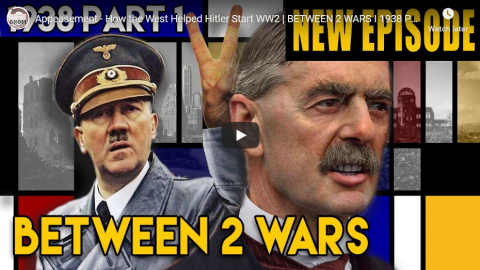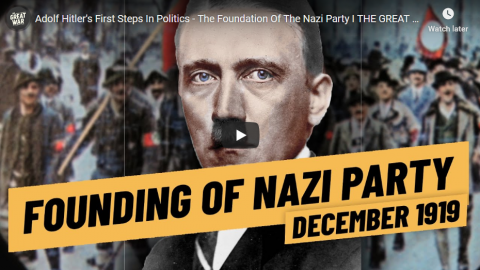World War Two
Published 10 Nov 2022Hitler commemorates the twentieth anniversary of the failed Beer Hall Putsch, in Auschwitz 50 men are shot in celebration, and Arthur Liebehenschel replaces Rudolf Höss as commandant.
(more…)
November 14, 2022
The Auschwitz Business Model – War Against Humanity 086
November 7, 2022
The only way to get a Grammy Award rescinded
I don’t follow the various entertainment industry awards (Oscar, Emmy, Grammy, Tony, etc.), so I wasn’t aware that only one Grammy Award has ever been taken back since they started handing them out. Given how disturbing the career lowlights of celebrities can be, what level of horrifying behaviour or criminal action does it take to have the award rescinded? Ted Gioia has the details:

“Milli Vanilli Blame it on the Rain (12 inch single)” by acme401 is licensed under CC BY-SA 2.0 .
Milli Vanilli, a pop duo act from Munich, will never enter the Rock & Roll Hall of Fame. They were hot back in 1990, and even won the Grammy for Best New Artist. Their debut album eventually sold ten million copies. But Fab Morvan and Rob Pilatus, the two musicians who performed as Milli Vanilli, are remembered today as a scandal and blot of shame on the music business.
What terrible thing did they do to get blacklisted and cancelled? You may already know, and if not, I’ll tell you.
Milli Vanilli’s Grammy was rescinded — the first and only time that has happened in the history of the award. I note that Bill Cosby still has his eight Grammy Awards. Even after Phil Spector’s murder conviction, nobody took away his prizes and honors.
But allow me to put matters in context first.
Looking back on the music stars of that era, it would be hard to create a greater scandal than, say, Michael Jackson. He was eventually arrested and charged with child molestation. Although Jackson never got convicted, the cumulative evidence is very troubling — even so, he gets plenty of airplay nowadays and is still lauded as the King of Pop. A high-profile musical celebrating his artistry opened on Broadway earlier this year.
The songs are great. I won’t deny it.
Jackson escaped a prison sentence, but many other music stars have served time for high-profile crimes without losing their fans. When R. Kelly recently got convicted of kidnapping, sexual exploitation of a child, and racketeering, his sales soared 500% in the aftermath. I’d prefer to disagree with those glib experts who claim “all publicity is good publicity” — but it’s hard to argue with those numbers.
Just a few weeks after the Milli Vanilli scandal, Rick James was charged with kidnapping and sexual assault — and then got arrested again for similar abuses three months later while out on bail. He continued to make recordings after his release from Folsom Prison, and returned to the Billboard chart. Health problems, not James’s criminal record, finally curtailed his career. And in 2020, his estate got a big payday by selling his masters and publishing rights to the Hipgnosis Song Fund.
Other music industry legends have committed murder or manslaughter. Suge Knight won’t become eligible for parole until 2034, and Phil Spector died while incarcerated for murder in 2021. The latter was widely praised in published obituaries, and his recordings remain cherished by fans.
And now let’s turn to Milli Vanilli.
Milli Vanilli haven’t fared so well. You might even say they have been wiped out of pop music history, lingering on merely as a joke or worse. But no one got raped or murdered by their antics. They didn’t even trash their hotel rooms or get arrested buying weed.
So what did they do that led to permanent cancellation?
Their crime was posing as vocalists on their recordings, when they didn’t actually sing. When they went on the road, they lip-synced on stage. And — if I can be blunt — their greatest transgression was making the people who vote on Grammy awards look foolish.
May 15, 2020
QotD: Gandhi and the rise of Hitler
Gandhi’s views on the European crisis were not entirely consistent. He vigorously opposed Munich, distrusting Chamberlain. “Europe has sold her soul for the sake of a seven days’ earthly existence,” he declared. “The peace that Europe gained at Munich is a triumph of violence.” But when the Germans moved into the Bohemian heartland, he was back to urging nonviolent resistance, exhorting the Czechs to go forth, unarmed, against the Wehrmacht, perishing gloriously — collective suicide again. He had Madeleine Slade draw up two letters to President Eduard Beneš of Czechoslovakia, instructing him on the proper conduct of Czechoslovak satyagrahi when facing the Nazis.
When Hitler attacked Poland, however, Gandhi suddenly endorsed the Polish army’s military resistance, calling it “almost nonviolent.” (If this sounds like double-talk, I can only urge readers to read Gandhi.) He seemed at this point to have a rather low opinion of Hitler, but when Germany’s panzer divisions turned west, Allied armies collapsed under the ferocious onslaught, and British ships were streaming across the Straits of Dover from Dunkirk, he wrote furiously to the Viceroy of India: “This manslaughter must be stopped. You are losing; if you persist, it will only result in greater bloodshed. Hitler is not a bad man …”
Gandhi also wrote an open letter to the British people, passionately urging them to surrender and accept whatever fate Hitler had prepared for them. “Let them take possession of your beautiful island with your many beautiful buildings. You will give all these, but neither your souls, nor your minds.” Since none of this had the intended effect, Gandhi, the following year, addressed an open letter to the prince of darkness himself, Adolf Hitler.
The scene must be pictured. In late December 1941, Hitler stood at the pinnacle of his might. His armies, undefeated — anywhere — ruled Europe from the English Channel to the Volga. Rommel had entered Egypt. The Japanese had reached Singapore. The U.S. Pacific Fleet lay at the bottom of Pearl Harbor. At this superbly chosen moment, Mahatma Gandhi attempted to convert Adolf Hitler to the ways of nonviolence. “Dear Friend,” the letter begins, and proceeds to a heartfelt appeal to the Führer to embrace all mankind “irrespective of race, color, or creed.” Every admirer of the film Gandhi should be compelled to read this letter. Surprisingly, it is not known to have had any deep impact on Hitler. Gandhi was no doubt disappointed. He moped about, really quite depressed, but still knew he was right. When the Japanese, having cut their way through Burma, threatened India, Gandhi’s strategy was to let them occupy as much of India as they liked and then to “make them feel unwanted.” His way of helping his British “friends” was, at one of the worst points of the war, to launch massive civil-disobedience campaigns against them, paralyzing some of their efforts to defend India from the Japanese.
Here, then, is your leader, O followers of Gandhi: a man who thought Hitler’s heart would be melted by an appeal to forget race, color, and creed, and who was sure the feelings of the Japanese would be hurt if they sensed themselves unwanted. As world-class statesmen go, it is not a very good record. Madeleine Slade was right, I suppose. The world certainly didn’t listen to Gandhi. Nor, for that matter, has the modern government of India listened to Gandhi. Although all Indian politicians of all political parties claim to be Gandhians, India has blithely fought three wars against Pakistan, one against China, and even invaded and seized tiny, helpless Goa, and all without a whisper of a shadow of a thought of ahimsa. And of course India now has atomic weapons, a satyagraha technique if ever there was one.
Richard Grenier, “The Gandhi Nobody Knows”, Commentary, 1983-03-01.
February 27, 2020
Appeasement – How the West Helped Hitler Start WW2 | BETWEEN 2 WARS I 1938 Part 1 of 4
TimeGhost History
Published 26 Feb 2020With the increasing aggression of Italy, Japan, and Germany in the 1930s, the League of Nations is becoming increasingly ineffective in regulating international disputes. Britain and France adopt a diplomatic strategy of appeasement to hold off all-out war and buy some crucial time. But will it work, and can Adolf Hitler’s territorial ambitions be contained?
Join us on Patreon: https://www.patreon.com/TimeGhostHistory
Hosted by: Indy Neidell
Written by: Francis van Berkel and Spartacus Olsson
Directed by: Spartacus Olsson and Astrid Deinhard
Executive Producers: Bodo Rittenauer, Astrid Deinhard, Indy Neidell, Spartacus Olsson
Creative Producer: Joram Appel
Post-Production Director: Wieke Kapteijns
Research by: Tom Meaden, Izzy Wilson, and Francis van Berkel
Edited by: Daniel Weiss
Sound design: Marek KamińskiSources:
Bundesarchiv_Bild:
102-08806, 102-08810, 102-09042,
119-5243, 146-1970-052-24, 146-1985-108-27A,
183-1987-0922-500, 183-R03618,
Photo from color by klimbim.Colorizations by:
– Daniel Weiss
– Norman Stewart
– Julius Jääskeläinen – https://www.facebook.com/JJcolorization/Soundtracks from Epidemic Sound:
– “The Inspector 4” – Johannes Bornlöf
– “Last Point of Safe Return” – Fabien Tell
– “Split Decision” – Rannar Sillard
– “Death And Glory 1” – Johannes Bornlöf
– “Guilty Shadows 4” – Andreas Jamsheree
– “Disciples of Sun Tzu” – Christian Andersen
– “First Responders” – Skrya
– “Easy Target” – Rannar Sillard
– “Death And Glory 3” – Johannes Bornlöf
– “The Charleston 3” – Håkan ErikssonA TimeGhost chronological documentary produced by OnLion Entertainment GmbH.
From the comments:
TimeGhost History
2 days ago (edited)
Hindsight is 20/20. It’s easy to look back at Anglo-French foreign policy in the 1930s and be shocked at how many mistakes politicians like Neville Chamberlain could make. This video will probably only add to that judgement, it more or less charts all the times Hitler could have been stopped but wasn’t. But put yourself in the context of the time. Memories of the Great War are only twenty years ago old, and the public has no appetite for another massive conflict. The global economy is only just showing signs of recovery after the Great Depression, and Britain and France barely have the industrial capacity to fight a modern war. So, imagine you’re Chamberlain (or any other politician of the time), are you really going to commit your country to war over a territorial disagreement between Germany and Czechoslovakia? The invasion of Poland in September 1939 shows that appeasement was a mistake. But maybe it was an understandable one? Let us know what you think in the comments.Cheers,
Francis.
December 18, 2019
Adolf Hitler’s First Steps In Politics – The Foundation Of The Nazi Party I THE GREAT WAR 1919
The Great War
Published 17 Dec 2019Get a free audiobook and 2 Audible Originals with a 30-day trial: http://audible.com/greatwar or text
greatwarto 500 500.Like many former soldiers, lance corporal Adolf Hitler was disillusioned with the new German Republic after the Armistice in 1918. Like man of his country men he was also in dire need of a job. The Bavarian Army provided an opportunity and soon young Adolf Hitler found himself in the ranks of an obscure political party in Munich: The German Workers’ Party.
» SUPPORT THE CHANNEL
Patreon: https://www.patreon.com/thegreatwar
Merchandise: https://shop.spreadshirt.de/thegreatwar/» SOURCES
Dietrich Eckart, Bolshevism from Moses to Lenin.
Gottfried Feder, Brechung der Zinsknechtschaft 1919.
Fest, Joachim C.: Hitler. Eine Biographie, 1973.
Heiden, Konrad: Adolf Hitler: Das Zeitalter der Verantwortungslosigkeit. Ein Mann gegen Europa, 2016.
Ulrich, Volker: Adolf Hitler. Band 1: Die Jahre des Aufstiegs 1889-1939. 2013.
Fest, Joachim C: The face of the Third Reich: Portraits of the Nazi Leadership. 1999
Program of the German Workers’ Party, 1920 (http://germanhistorydocs.ghi-dc.org/s…)
Jeremy Noakes and Geoffrey Pridham, eds., Nazism 1919-1945, Vol. 1, The Rise to Power 1919-1934. Exeter: University of Exeter Press, 1998, pp. 12-14.»CREDITS
Presented by: Jesse Alexander
Written by: Jesse Alexander
Director: Toni Steller & Florian Wittig
Director of Photography: Toni Steller
Sound: Toni Steller
Editing: Toni Steller
Motion Design: Phillip Appelt
Mixing, Mastering & Sound Design: http://above-zero.com
Maps: Daniel Kogosov (https://www.patreon.com/Zalezsky)
Research by: Markus Linke
Fact checking: Florian WittigChannel Design: Alexander Clark
Original Logo: David van StepholdA Mediakraft Networks Original Channel
Contains licensed material by getty images
All rights reserved – Real Time History GmbH 2019
April 23, 2015
Kicking Neville Chamberlain while he’s dead
Poor old Neville … he’s become such a byword for failure that they’re even comparing Barack Obama to Chamberlain. This is hardly fair to either party:
One of the hardest things to do in history is to read history in context, shutting out our foreknowledge of what is going to happen — knowledge the players at the time did not have.
Apparently Neville Chamberlain is back in the public discourse, again raised from the dead as the boogeyman to scare us away from any insufficiently militaristic approach to international affairs.
There is no doubt that Neville Chamberlain sold out the Czechs at Munich, and the Munich agreement was shown to be a fraud on Hitler’s part when he invaded the rest of Czechoslovakia just months later. In retrospect, we can weep at the lost opportunity as we now know, but no one knew then, that Hitler’s generals planned a coup against him that was undermined by the Munich agreement.
But all that being said, let’s not forget the historic context. World War I was a cataclysm for England and Europe. It was probably the worst thing to happen to Europe since the black death. And many learned folks at the time felt that this disaster had been avoidable (and many historians today might agree). They felt that there had been too much rush to war, and too little diplomacy. If someone like Britain had been more aggressive in dragging all the parties to the bargaining table in 1914, perhaps a European-wide war could have been avoided or at least contained to the Balkans.
If you’ve read my Origins of WW1 posts, you’ll probably agree that Britain alone could not have averted the First World War, although they could have stayed out of the war (which would probably have guaranteed a German victory by 1916). Unlike the attitudes in 1914, few Europeans wanted any kind of war in the late 1930s, having learned too well what the casualties of modern war could be. The idea that Chamberlain and Édouard Daladier could somehow have deterred Hitler requires an amazing lack of awareness of the political realities in Britain and France at the time … and of the state of the respective armed forces of the two nations. Neither politician could have survived the reaction if they’d forced Hitler’s hand … which might well have served Hitler’s purposes just as well as the “scrap of paper” did in the end.
In a postscript, Warren also points out that FDR could just as easily take the place of Neville Chamberlain for his own “sell out” of Poland and the rest of what became the Warsaw Pact “allies”:
Years ago in my youth I used to excoriate FDR for caving into Stalin at Yalta, specifically in giving away most of Eastern Europe. I still wish he hadn’t given his moral authority and approval to the move, but even if we stood on the table and screamed at Stalin in opposition, what were we going to do? Was there any appetite for extending the war? Zero. That is what folks who oppose the dropping of the atomic bombs on Japan get wrong in suggesting there were alternatives. All those alternatives involved a longer war and more American deaths which no one wanted.
September 30, 2013
Re-evaluating Neville Chamberlain
BBC News Magazine on the reputation of British PM Neville Chamberlain:
…this derogatory reference reflects the continuing potency of a well-established conventional wisdom assiduously propagated by Chamberlain’s detractors after his fall from the premiership in May 1940. As Churchill is once supposed to have quipped, “Poor Neville will come badly out of history. I know, I will write that history”.
In his influential account The Gathering Storm, published in 1948, Churchill characterised Chamberlain as “an upright, competent, well meaning man” fatally handicapped by a deluded self-confidence which compounded an already debilitating lack of both vision and diplomatic experience. For many years, this seductive version of events remained unchallenged and unchallengeable.
[…]
The Munich agreement, which later came to symbolise the evils of appeasement, was signed 75 years ago, in the early hours of 30 September. At Munich, Britain and France acquiesced in the dismemberment of Czechoslovakia and the transfer of its Sudeten region to Germany in face of Hitler’s increasingly bellicose threats of military action. Chamberlain’s hopes that this humiliating sacrifice would satisfy Hitler’s last major territorial demand and thus avert another catastrophic war were dashed within four months.
After this monumental failure of policy Chamberlain’s name became an abusive synonym for vacillation, weakness, immoral great-power diplomacy and, above all, the craven appeasement of bullies — whatever the price in national honour. Despite his many achievements in domestic policy, therefore, ultimately Chamberlain’s reputation remains indelibly stained by Munich and the failure of his very personal brand of diplomacy.
As he confessed in the Commons at the outbreak of war, “Everything I have worked for, everything that I have hoped for, everything that I have believed in during my public life, has crashed into ruins.”





